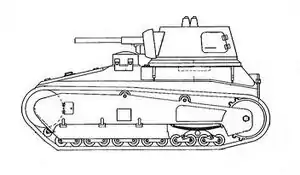Leichttraktor
The Leichttraktor (Vs.Kfz.31) was a German experimental tank designed during the Interwar Period.
| Leichttraktor Vs.Kfz.31 (Versuchs Kampffahrzeug 31) | |
|---|---|
 Profile of the Rheinmetall Leichttraktor | |
| Type | Light tank |
| Place of origin | Weimar Republic |
| Service history | |
| In service | 1930–1945 |
| Used by | Weimar Republic Nazi Germany |
| Wars | World War II (Training only) |
| Production history | |
| Designed | 1929–1933 |
| Manufacturer | Krupp, Rheinmetall |
| Produced | 1930 |
| No. built | 4 |
| Specifications | |
| Mass | Krupp: 8.7 tonnes (9.6 short tons; 8.6 long tons) Rheinmetall: 8.96 tonnes (9.88 short tons; 8.82 long tons) (Rheinmetall) |
| Length | Krupp: 4.35 m (14 ft 3 in) Rheinmetall: 4.21 m (13 ft 10 in) |
| Width | Krupp: 2.37 m (7 ft 9 in) Rheinmetall: 2.26 m (7 ft 5 in) |
| Height | Krupp: 2.35 m (7 ft 9 in) Rheinmetall:2.27 m (7 ft 5 in) |
| Crew | 4 (commander, driver, radio operator, and loader) |
| Armor | top frontal 14 mm, bottom frontal 19 mm, sides 8 + 6 mm, back 14 mm, bottom 5 mm, bonnet 6 mm, front slanting wall of turret 5 mm, turret sides 14 mm, turret rear 14 mm, turret top 5 mm, cupola 14 mm. Turret appears to be 14 mm all around. (Krupp) [1] |
Main armament | 3.7 cm KwK L/45 |
Secondary armament | 7.92×57mm Mauser MG 13 machine gun |
| Engine | Daimler-Benz M36 six-cylinder liquid-cooled gasoline engine. 100 hp (75 kW) |
| Suspension | Krupp: Coil spring (Krupp) Rheinmetall: Leaf spring |
Operational range | 137 km (85 mi) on-road |
| Maximum speed | 30 km/h (19 mph) |
History
After the end of World War I, Germany was restricted in military development by the Treaty of Versailles. However, a secret program under the name cover "Traktor" was developing armoured military vehicles and artillery. Its engine was mounted inside the front portion of the hull and the turret was mounted above the fighting compartment in the rear of the tank. Both Rheinmetall and Krupp produced prototypes, and in 1928, Rheinmetall was awarded the order of 289 tanks. However, some time later, the order was cancelled.[2] Krupp models had coil spring suspensions, while Rheinmetall had leaf spring suspensions.
The Germans tested the tank in the Soviet Union under the Treaty of Rapallo – agreed between the USSR and Germany in 1922 under high secrecy and security. The testing facility used from 1926 to 1933 was named Panzertruppenschule Kama, located near Kazan in the Soviet Union. The location was a joint testing ground and tank training ground for the Red Army and Reichswehr. It was codenamed "Kama" from the words Kazan and Malbrandt because the testing grounds were near Kazan and Oberstleutnant Malbrandt was assigned to select the location for testing.[3]
Leichter Traktor ("Light tractor") was a cover name for all three medium tank designs produced there.[4] In the early years of World War II it was used as a training tank.[5]
References
Citations
- "Original Leichttraktor manual" (PDF). Retrieved 9 July 2019.
- "The German Leichttraktor VK-31 Light Tank". TankNutDave.com. Retrieved 2020-03-23.
- Higgins 2015, p. 13.
- White p48
- Tank, Kenneth Macksey, John H. Batchelor, 1971
Bibliography
- Peter Chamberlain & Hilary Doyle (1999). Sterling (ed.). Encyclopedia of German Tanks of World War Two. ISBN 1854095188.
- Higgins, David R. (2015). Panzer II vs 7TP: Poland 1939. Oxford: Osprey. ISBN 9781472808820.
Further reading
- Tanks of the World, 1915-1945, Peter Chamberlain, Chris Ellis, 1972
- German Tanks and Armoured Vehicles 1914 - 1945, B. T. White, 1966